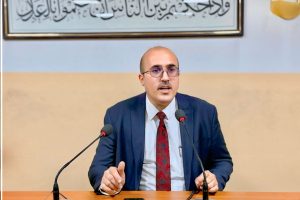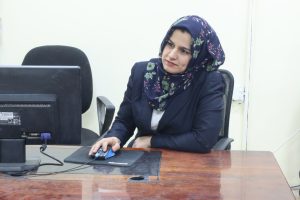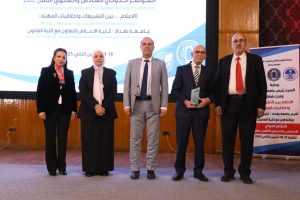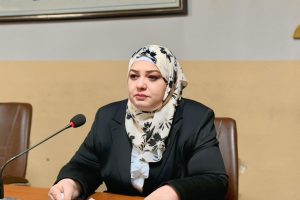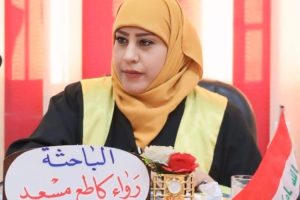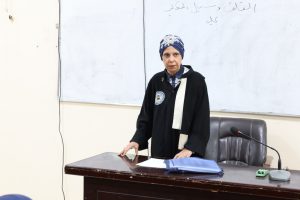The branch of public law was established with the rest of the branches in the College of Law-University of Baghdad under Regulation No. 8 of 1939, and the branch started a postgraduate study (LLM.) in 1967-1968, and a PhD. degree in the academic year of 1974-1975.
This branch plays a pivotal role in legal specializations in general, as its constitutional, administrative, and financial sciences form the backbone of legal studies. Moreover, most of them contributed to providing studies and providing legal advice to state institutions, and they had an active role in activating the legislative movement and its development in Iraq. The public law branch is keen that its affiliates, students, and professors enjoy a distinguished position among the branches and departments of law faculties, through the quality of the academic programs it adopts and the unique achievements in the field of scientific research, as well as the contribution to community service and the development of its members.
The public law branch employs its specializations in the areas of constitutional law, administrative law, public finance and tax legislation, and labor and social security law, graduating qualified specialists who are qualified to educate and develop people and spread legal culture among them by providing distinguished legal education, and in this context, it seeks to develop new studies that are in line with the needs of public affairs in society.
The public law branch is concerned with the organization of postgraduate, master’s and doctoral studies in the following specializations:
- Administrative Law
- Public Finance
- Constitutional Law
The number of students graduating as highly qualified academics who undertake academic tasks in Iraqi universities, as well as in the judiciary, the rest of the state departments, its various ministries, and the State Council, since the branch of public law and over the years produced an elite group of jurists in the aforementioned specializations. They had an important role in society and political life. The branch looks forward to The public law branch aims to hold specialized scientific conferences within the framework of the general branch, the latest of which was the conference that was held in 2018, in addition to participating in the study of the Professional Diploma in Anti-Corruption in terms of teaching and supervising students. The scientific staff of teachers who hold certificates and scientific titles continue the scientific and research giving.
Vision
The Public Law Branch is keen to ensure that its affiliates, both students and professors, have a distinguished position. It has a distinguished position among the departments of faculties of law, through the quality of the academic programs it adopts and through its unique achievements in the field of scientific research, as well as its contribution to community service and the development of its members.
Message
The Public Law Branch employs its specializations in the areas of constitutional law, administrative law, public financial affairs, and financial legislation. graduates, competent specialists qualified to educate and develop people and disseminate the legal culture among them, by providing distinguished legal education, and seeks, in this context, to develop new studies that are in line with the needs required by public affairs in society.
Goals
The Public Law Branch seeks to reach several goals and objectives, including:
- Providing a distinguished pattern of university education in the field of law, consistent with quality standards, and consistent with the requirements of legal academic studies. .
- Providing state institutions with legal competencies of proficiency and professionalism, capable of developing ways and means that overcome obstacles, discover solutions and overcome problems.
- Developing scientific research, whether at the level of research of faculty members or at the level of research of postgraduate students, and upgrading its content in the scale of quality, through seriousness in contributing to solving problems related to community service and the requirements of the labor market.
Head of the Branch
Prof. Dr.
Ali Hadi Atia
Curriculum Vitae
Ali Hadi Atia
Curriculum Vitae
Prof. Dr.
Maha Bahjat Younis
Curricula vitae
Maha Bahjat Younis
Curricula vitae
Prof. Dr.
Ban Salah Abdulqadir
Curricula Vitae
Ban Salah Abdulqadir
Curricula Vitae
Prof. Dr.
Waleed Mirza Hamza
Curricula Vitae
Waleed Mirza Hamza
Curricula Vitae
Prof. Dr.
Saba Noman Rasheed
Curriculum vitae
Saba Noman Rasheed
Curriculum vitae
Professor Dr.
Rasha Mohammed Jafar
Curriculum Vitae
Rasha Mohammed Jafar
Curriculum Vitae
Professor Dr.
Musdak Adel Taleb
Curricula vitae
Musdak Adel Taleb
Curricula vitae
Assistant Professor Dr.
Ammar Fawzy Almayahi
Curriculum Vitae
Ammar Fawzy Almayahi
Curriculum Vitae
Assistant Professor Dr.
Tagreed Mohammed Qadori
Curriculum Vitae
Tagreed Mohammed Qadori
Curriculum Vitae
Assistant Professor
Khatam Hamadi Mahmood
Curriculum Vitae
Khatam Hamadi Mahmood
Assistant Professor Dr.
Sura Harith Abdulkareem
Curriculum Vitae
Sura Harith Abdulkareem
Curriculum Vitae
Lecturer Dr.
Rabab Khalil Ibarhim
Curriculum Vitae
Rabab Khalil Ibarhim
Curriculum Vitae
Lecturer Dr.
Omar Mahdi Hamdi
Curricula Vitae
Omar Mahdi Hamdi
Curricula Vitae
Lecturer
Huda Faiq Abd ALrhman
Curriculum Vitae
Huda Faiq Abd ALrhman
Curriculum Vitae
Lecturer
Zinah Rajab Hussein
Curriculum Vitae
Zinah Rajab Hussein
Curriculum Vitae
Assistant Lecturer
May Majeed Abood
Curricula vitae
May Majeed Abood
Curricula vitae
Assistant Lecturer
Tabarak Mahmood Shuker
Curricula vitae
Tabarak Mahmood Shuker
Curricula vitae
Assistant Lecturer
Rusul Hussein Hasan
Curriculum Vitae
Rusul Hussein Hasan
Curriculum Vitae
Assistant Lecturer
Hiba Neama Mansor
Curricula vitae
Hiba Neama Mansor
Curricula vitae

